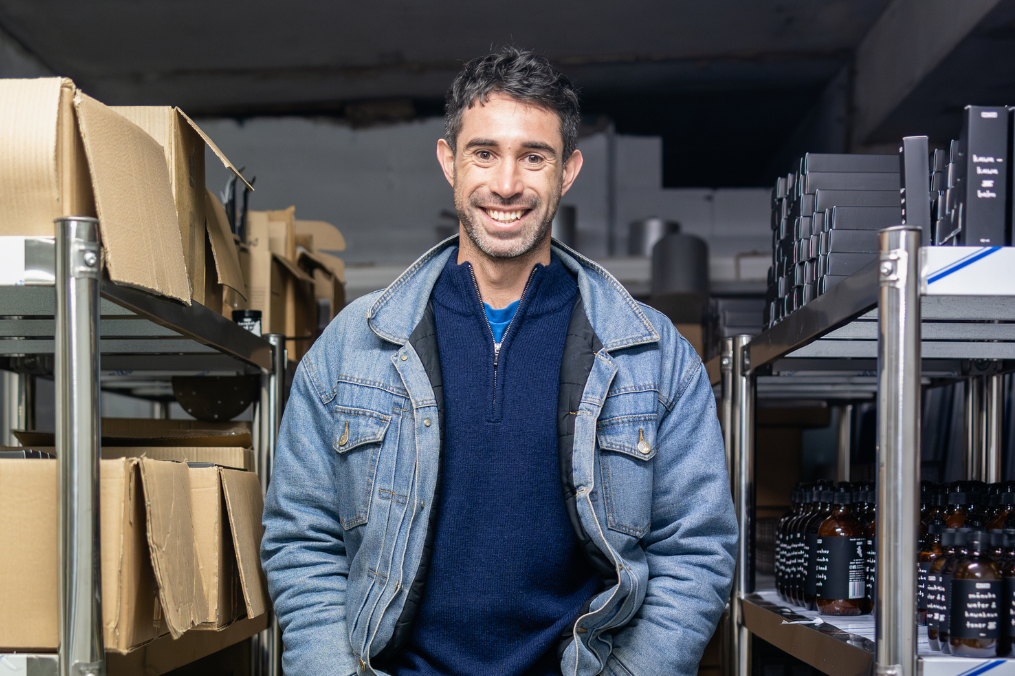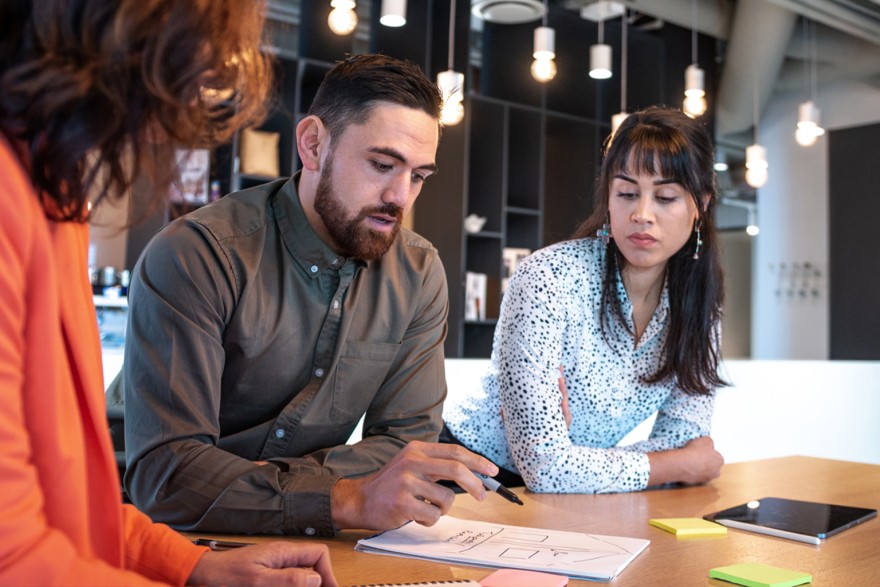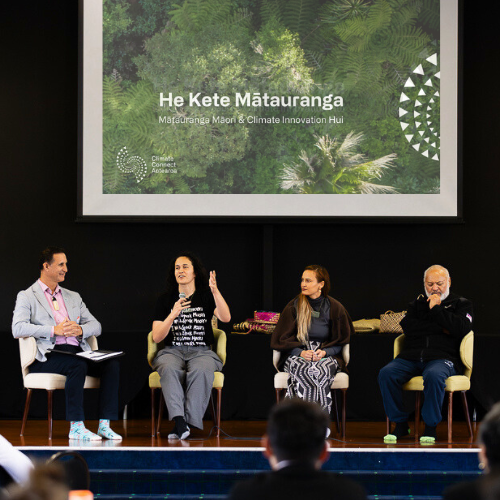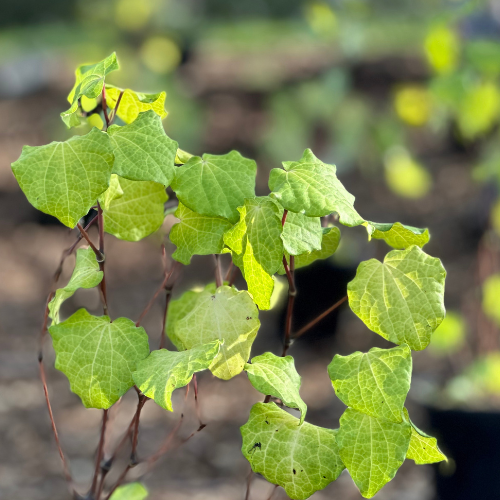This whakapaparanga kōrero expresses the relationship between people and the natural world in te ao Māori (the Māori world). Beginning with the primordial parents, Ranginui and Papatūānuku, and their offspring, it reflects the interconnectedness of the earth, sea, sky, and all living things. Reminding us that we are bound by whakapapa (genealogy) to the environment, sharing a mauri (lifeforce), and that we have a responsibility to restore and look after the mauri of both parents – Ranginui and Papatūānuku – the domains of the true kaitiaki (custodians) and all life within them.
Understanding this concept provides an insight into a Māori perspective of climate change and adaptation as we seek taurite (balance) for our actions and practices in relation to the environment.
“We need to remember our place and rebalance our relationship with the taiao (the natural world),” says Dr Dan Hikuroa (Ngāti Maniapoto, Ngaati Whanaunga), Earth Systems Scientist and Associate Professor in Māori studies at the University of Auckland.
Māori have a long history of adapting to changing environments. Whether acclimatising to Aotearoa from their tropical homeland or adopting new technologies that came with tauiwi (non-Māori) arriving on these shores, Māori not only adapted but flourished. As the planet warms and extreme weather events become more frequent and intense, climate adaptation has become increasingly critical. Mātauranga Māori (Māori knowledge systems), and cultural values held within te ao Māori, offer a framework to prepare for and adjust to climate change.
As we explore climate adaptation for businesses and communities, balance is key. Just as Māori ancestors sought balance in nature, today’s small and medium-sized enterprises (SMEs) can align their practices with Māori values to build resilience and adapt in the face of climate change.
ClimateWise – Better business planning in a changing climate
SMEs are the backbone of our economy in Aotearoa, accounting for 99 per cent of all businesses. However, when addressing the challenges of climate change, SMEs are typically more vulnerable due to limited access to information and resources, in comparison to bigger companies and the public sector who are regulated and have a larger resource base. The challenges are often compounded for pakihi Māori (Māori businesses) who generally operate with lower margins and are often in sectors that are more exposed to the impacts of climate change, such as primary industries and construction.
ClimateWise, an initiative of Climate Connect Aotearoa, is an online learning platform being developed to support businesses in Aotearoa to plan for and adapt to climate change. Launching in early 2025, the platform will provide free, easy-to-understand resources to help businesses to prepare for climate-related disasters and manage risks. ClimateWise looks to mātauranga Māori and cultural values, offering SMEs tools to reduce risks, identify opportunities, and build resilience while aligning with te ao Māori perspectives.
Mātauranga Māori and climate adaptation
Mātauranga Māori offers valuable insights into responding to climate change. In relation to the taiao, it is based on interconnectedness and includes observations of natural signs seen in the behaviours of water, plants, animals and weather patterns. By considering this approach when developing modern climate strategies, businesses can develop more effective and sustainable solutions.
“Where mātauranga Māori and indeed other indigenous knowledge has a key role to play is that it brings in hundreds of years of observations of having lived in or part of those places.” Dr Dan Hikuroa
Examples of Māori adaptation can be found in the traditional use of environmental tohu (signs). For instance, Māori recognised the significance in the appearance or behaviour of region-specific birds as an indicator of the onset of bad weather – kārearea in one area, and pūkeko in another. Similarly, food security for iwi (tribal groups) and hapū (sub-tribe) is protected by observing the flowering of certain trees, or even the blooming process to indicate how plentiful a crop was likely to be. More personal kōrero (stories) includes whānau groups having winter and summer papakāinga (homebases) following seasonal food source availability, and relocation of marae due to catastrophic weather events.
Drawing on this intimate understanding of the environment in conjunction with the maramataka, the Māori lunar calendar, and reading of celestial bodies, Māori identified various environmental tohu unique to rohe (tribal regions) that enable them to thrive in that specific environment.
Utilising some of this traditional knowledge, and the cultural values that sit alongside it, can provide targeted and usable support for SMEs, in Tāmaki Makaurau and throughout the motu (country), incorporating similar principles of observation and responsiveness as they plan to adapt to climate change.

Two pakihi Māori already utilising principles of observation and tikanga Māori to guide their growing commercial ventures are skincare range Aotea Made and the still-in-development clean energy company, Aotea Energy. Based on Aotea Great Barrier Island and founded by local Tama Toki (Ngāti Wai, Ngāpuhi), both initiatives integrate traditional knowledge and values into business and climate adaptation. Growing up on the island with his grandparents, Toki has brought first-hand, personal experience of the taiao and life on the island to his enterprises. The success of the original venture Aotea Made highlighted the necessity for a clean, self-reliant energy source. The result is the creation of its own peer energy system using solar power on Aotea that allows users to ‘koha’ (share) excess power with the community.
Referring to environmental changes seen in recent years on Aotea, including mānuka blooming and cicadas emerging from the ground during winter months, Toki believes that when addressing climate change you need to look at the system as a whole. He advises other pakihi looking for a te ao Māori perspective on climate-related issues to consult with mātanga Māori (experts) and “always be guided by tikanga”.
Importance of climate adaptation for pakihi Māori
Aligned with concept of ako, a te ao Māori model of learning, climate adaptation as a process is cyclical and on-going. Emphasising the point that one-time tasks or solutions will not be sufficient, and the journey is continuous.
For Māori SMEs, climate adaptation is crucial not only for environmental stewardship but for business continuity and resilience. These businesses operate with fewer resources than larger companies, making them more vulnerable to climate risks. ClimateWise will offer practical, user-friendly tools to support these businesses.
During recent workshops conducted by Climate Connect Aotearoa with pakihi Māori, several key themes emerged from the kōrero, centred on the alignment of adaptation strategies with te ao Māori values. These include:
- Environmental stewardship
Referred to as te ao Māori values of Utu and Manaakitanga, environmental stewardship was identified as a focus. Utu, meaning reciprocity or rebalancing acknowledges that we have a responsibility to ensure that our environment is kept healthy. Manaakitanga, in this context, referring to a duty of care to the environment as well as employees, customers and community. In practical terms, this could include business continuity planning to ensure SMEs are able to continue serving their community during and after climate-related events.
- Whakapapa and whanaungatanga
These values are expressed in an intergenerational way of thinking from origin narratives to mokopuna (grandchildren) decisions, and the acknowledgement of the interdependence of all living things. Leading to more holistic approach of viewing climate-related risks and opportunities this includes environmental, social and cultural considerations.
- Mauri and mana
Mauri, the essence of life or lifeforce, is described as the impression we leave behind during all interactions with people and intentions for the taiao. It urges business owners to consider how they would like their mauri to be described by others and by generations to come. The value of mana is cumulative in nature; over time mana is either enhanced or diminished by our actions. When our personal and business mana is intact it tends to be reflected when conducting business. Climate adaptation planning alongside other business plans ensures that one’s personal and business mana reflects positively on themselves and their mahi now, and into the future. Therefore, mauri and mana become an essential part of maintaining and ensuring long-term sustainability and respect for the environment.
Building a resilient future
Ko te amorangi ki mua, ko te hāpai ō ki muri
The leader at the front and the workers behind the scenes
This whakataukī (Māori proverb) recognises the importance of planning and preparation.
ClimateWise will serve as a valuable resource for businesses across Aotearoa, offering practical guidance for climate adaptation and helping them explore the benefits of adapting to climate change. This approach is aligned with a global trend, where sustainable environmental and socially responsible business practices are not only more intentionally adopted and applied but are also used to attract a customer base.
By incorporating mātauranga Māori and aligning business practices with te ao Māori values, SMEs can not only survive but thrive in a changing climate. This approach supports both long-term sustainability and community resilience, ensuring that future generations inherit a healthy environment and strong, resilient businesses.
ClimateWise will serve as a kāinga (home) for SMEs to access the knowledge they need to be good leaders and, ultimately, good ancestors.


